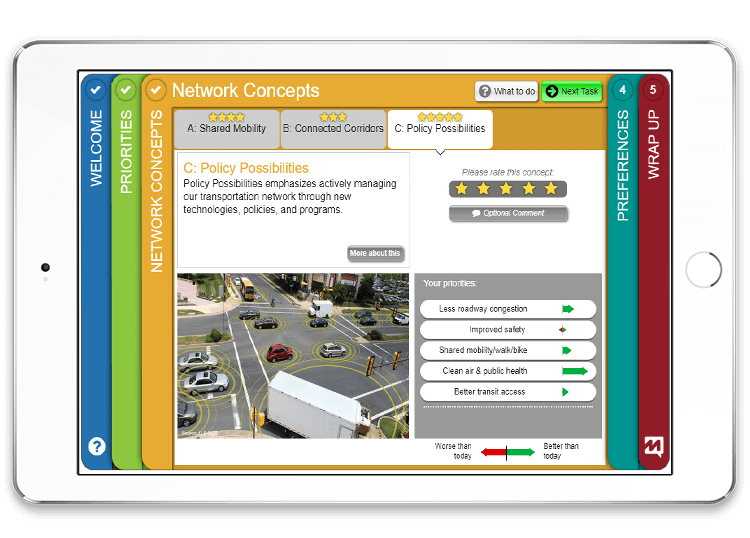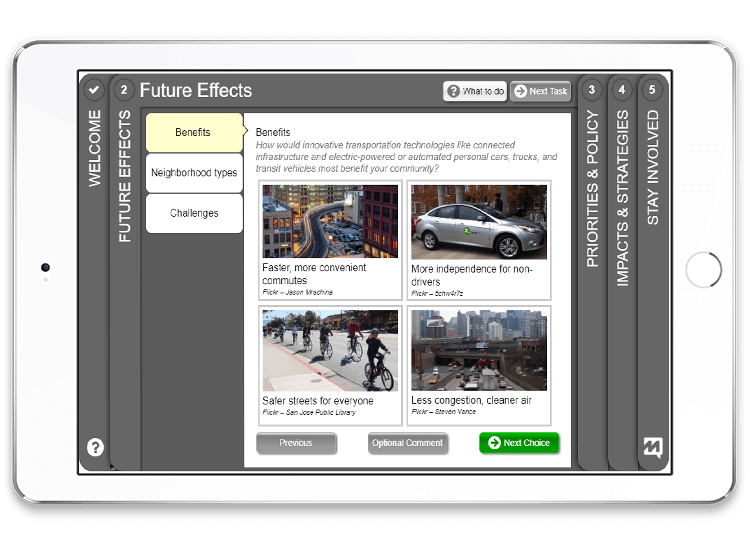How to Engage Residents in Sustainable Transportation Planning
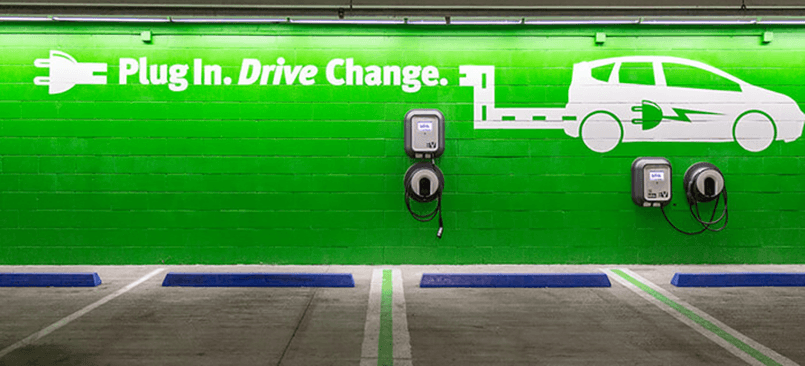
With climate change becoming an increasingly important issue, we’ve seen several transportation planners use the dynamic features of MetroQuest to take action! We would like to acknowledge the San Diego Regional Planning Agency (SANDAG), Chicago Metropolitan Agency for Planning (CMAP), Southwestern Pennsylvania Commission (SPC), and the Office of Intermodal Planning and Investment (OIPI) for their sustainability planning initiatives and contributions to making the world a better place.
San Diego Regional Planning Agency (SANDAG)
SANDAG used their MetroQuest Site to gain feedback on their environmentally focused 2019-2050 Regional Plan. Each MetroQuest Site contains a Welcome Screen, a Wrap Up Screen, and three additional question screens to suit the needs of the project (selected from 14 available Screen templates). SANDAG selected the Priority Ranking Screen, the Scenario Rating Screen, and the Tradeoffs Screen in their MetroQuest Site allowing them to both educate and collect valuable input from the public!
The Priority Ranking Screen allowed San Diego residents to rank five of the seven available priorities, such as climate change and public health, and to provide input on which they viewed as the most important issues to address. This allowed SANDAG to gain insight into the perspectives and preferences of the public, and learn what initiatives they should direct more attention to now and in the future.
The Scenario Rating Screen gave participants the ability to rate the three possible network concepts, and illustrate the extent to which each solution addressed their priorities on the Priority Ranking Screen. Residents were able to compare strategies, see the pros and cons of each, and then weigh in by rating each scenario. This Screen let participants gain an understanding of each option in just a few minutes before they voiced their opinions. For SANDAG this meant trustworthy and actionable data!
The Tradeoffs Screen was used to educate residents about critical decisions facing planners and collect feedback on the most preferable transportation options. Due to budget constraints implementing every project is simply not possible, but with their MetroQuest Site, SANDAG can better address the future needs of San Diego residents, all while minimizing harm to the environment.
Chicago Metropolitan Agency for Planning (CMAP)
CMAP project Alternative Futures: Innovative Transportation is another great example of environmentally friendly transportation planning! CMAP chose the Image Rating Screen and two Standard Survey Screens to gather informed input on how new transportation technologies will affect individual citizens.
The dynamic Visual Preference Screen asked participants three crucial questions: 1. what technological advancements would benefit your community most? 2. where would you live if your commute was more convenient? and 3. what are your concerns with new transportation technologies? The Visual Preference Screen offered valuable insights into the technological advancements necessary and where they should be implemented.
The two Standard Survey Screens allowed residents to share their preferences regarding future transportation options, and gave CMAP insight into how to ensure equitable access to technology, reduce congestion, and expand parking options. Additionally, the Standard Survey Screens aided CMAP in solving a problem that many of us in transportation planning face – how to keep public transit competitive with new technology.
Southwestern Pennsylvania Commission (SPC)
SPC launched the innovative Forces of Change survey, which embraced change by asking the public’s input on how to best cope with the external forces facing their future. Their MetroQuest Site reviewed several different factors, such as: population changes, new energy, and aging infrastructure. With new technologies being one of the categories, this survey offered valuable data needed to construct a better future, and incorporated a Strategy Rating Screen and a Standard Survey Screen.
The Strategy Rating Screen asked participants to examine a range of areas that many be impacted by external forces and weigh in on the urgency of each one using a quick star rating. On the Standard Survey Screen participants answered questions on which communities they believed will be most and least impacted by a range of external forces including the environmental and technological change.
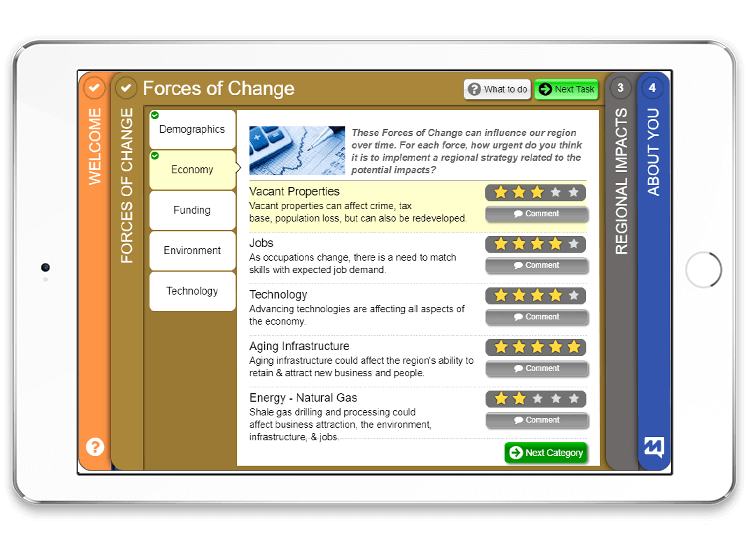
Office of Intermodal Planning and Investment (OIPI)
OIPI used MetroQuest to enhance their knowledge of public preferences as they planned for the green future of transportation in their VTrans2040 survey. Vtrans2040 used two Priority Ranking Screens to ask residents what they believed were the three biggest opportunities and concerns with emerging transportation technologies, such as autonomous vehicles and mobility-on-demand services.
The Strategy Rating Screen allowed OIPI to gain insight into how Virginia residents thought they should invest in the transportation system. Participants rated potential improvements on a scale of one to five, with “five” being the most important. Additionally, the Strategy Rating Screen gave OIPI a greater understanding of the wishes and needs of residents, which projects to prioritize, and where they should allocate resources.
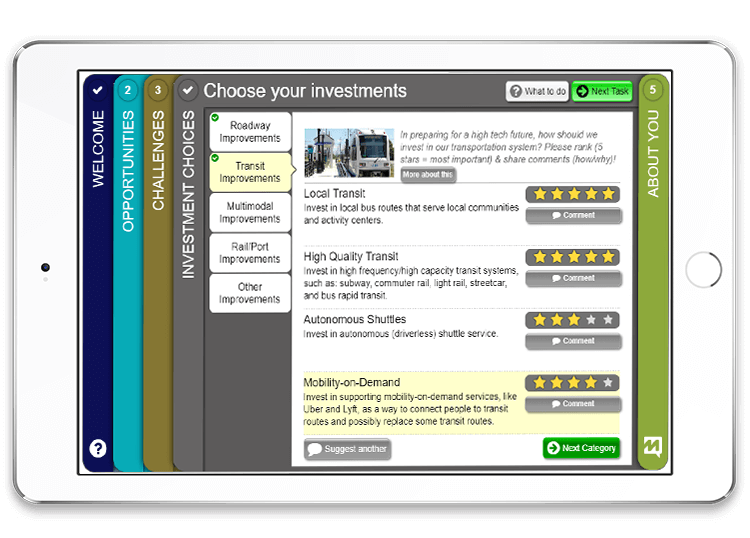
Thank you San Diego Regional Planning Agency, Chicago Metropolitan Agency for Planning, Southwestern Pennsylvania Commission, and the Office of Intermodal Planning and Investment for your proactive efforts to fight climate change and implement environmentally friendly transportation plans. We are looking forward to seeing the implementation of these innovative and environmentally friendly solutions. We’re confident that these public engagement efforts will help to support a bright future for your transportation systems.
